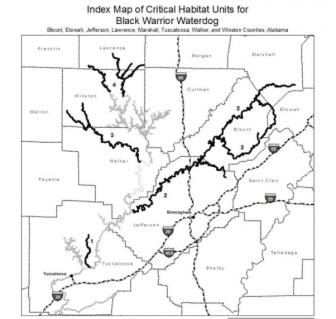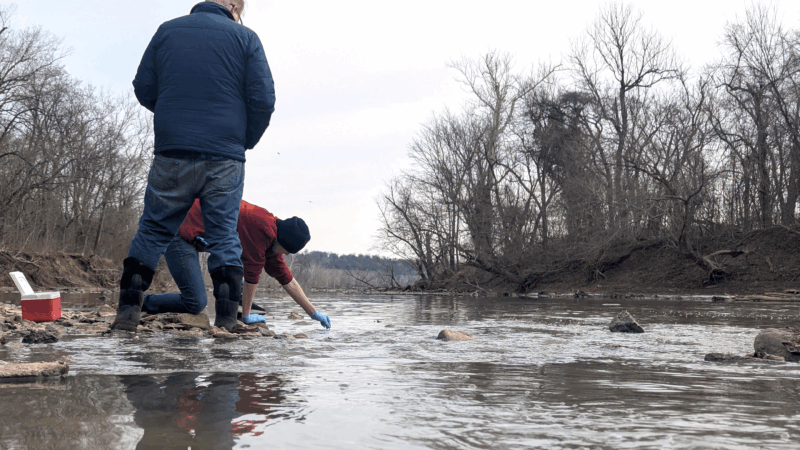Unique Alabama Salamander Now Federally Protected
The U.S. Fish and Wildlife Service announced Tuesday that it would protect a rare Alabama salamander under the Endangered Species Act. The Black Warrior waterdog, sometimes called the Alabama mudpuppy, is large, strange, and found only in the state.
Black Warrior waterdogs are nocturnal and can be almost a foot long. Their permeable skin and external gills make them sensitive to declines in water quality. That’s one reason the Fish and Wildlife Service listed them as endangered: their numbers have fallen because of habitat destruction and pollution in the Black Warrior River Basin from industrial plants, landfills, sewage treatment plants, construction, forestry, poultry farms, cattle feedlots, and mines. Dams disrupt the creatures’ lifecycle, too.
The Wildlife Service also designated 420 miles of the river and tributaries across 10 counties as critical habitat for the waterdog. Many of these places are already designated as critical for other endangered species, so regulators say little further action is needed.
A statement from the Fish and Wildlife Service says, “The habitat designation should have minimal or no impact on the forestry and coal mining community.”
But private landowners could face extra hurdles for projects that need federal funding or permits.
The Black Warrior waterdog was first put on the candidate list for federal protection in 1982. The Center for Biological Diversity, a national nonprofit conservation group based in Tucson, petitioned for the salamander’s protection in 2004 and again in 2010. Today’s decision is partly a result of CBD efforts.
“Aquatic salamanders like the Black Warrior waterdog are indicator species that reflect the health of the environment we all share,” says CBD senior scientist Tierra Curry. “Protecting this special amphibian and its habitat will help protect water quality for both waterdogs and people.”
In Birmingham, Black Warrior Riverkeeper staff attorney Eva Dillard says, “The U.S. Fish and Wildlife Service made our New Year happy today.”
But the group didn’t get everything it had hoped for.
Dillard says the Wildlife Service had originally “proposed to designate 669 river miles within eleven tributaries of the Black Warrior River basin as critical habitat. Unfortunately, the Service’s announcement today cuts that proposed habitat by a third … While we are disappointed that the waterdog’s habitat was not fully protected as first proposed, we are pleased with the listing of the waterdog as endangered and the designation of critical habitat for this imperiled species.”
Nelson Brooke of Black Warrior Riverkeeper took part in the peer review process. The rule goes into effect in 30 days.
The Black Warrior waterdog spends almost all its life at the bottom of streams under submerged ledges, logs and rocks. It also retains juvenile features like feathery gills and a tail fin even after it matures.
Scientists worry about lasting damage from Potomac sewage spill
Drinking water around the District of Columbia hasn't been contaminated. But scientists say the environmental damage could be severe.
Using saliva to detect disease holds promise, but it’s not perfected yet
Easier than a blood test, saliva tests have the potential to detect cavities, infections and even cancer. But a lack of insurance coverage and other obstacles stand in the way of wider use.
What worked and what didn’t with a cellphone ban at a Kentucky school
Keeping students off their devices is the new norm in many schools. We talked to students and educators at one Kentucky school to see how it's working.
Israeli settlers kill 19-year-old Palestinian American, officials and witnesses say
Israeli settlers in the occupied West Bank shot and killed a Palestinian American man during an attack on a village, the Palestinian Health Ministry said.
Trump says he doesn’t know if aliens are real but directs government to release files on UFOs
President Donald Trump said Thursday that he's directing the Pentagon and other government agencies to release files related to extraterrestrials and UFOs because of "tremendous interest."
Trump warns of ‘bad things’ if Iran doesn’t make a deal, as second U.S. carrier nears Mideast
Iran held annual military drills with Russia on Thursday as a second American aircraft carrier drew closer to the Middle East.







